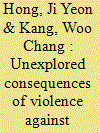| Srl | Item |
| 1 |
ID:
148519


|
|
|
|
|
| Summary/Abstract |
Regional bloc voting in South Korea has been ascribed to voters’ psychological attachments to birthplace. This article seeks to expand the existing discussion of regionalism by showing that economic conditions in voters’ places of residence affect vote choices at the individual level and produce clustering of votes at the aggregate level in South Korea. While the idea of residence-based regionalism has previously been suggested, empirical scrutiny of the idea has been limited. Exploiting a Bayesian multilevel strategy, this article provides evidence that short-term economic changes at the province level affected voters’ choices in the 2007 presidential election in South Korea, independent of the long-term political affiliation between regional parties and their constituents. The positive association between local economic conditions and vote choices remains significant, controlling for perceptions of national economic conditions and other individual level covariates such as age and political attitudes.
|
|
|
|
|
|
|
|
|
|
|
|
|
|
|
|
| 2 |
ID:
156421


|
|
|
|
|
| Summary/Abstract |
In this paper, we examine the extent to which wartime violence against civilians during the Korean War affects people's current attitudes toward South Korea and other involved countries. Using a difference-in-differences (DID) approach that compares the cohorts born before and after the war, we find that direct exposure to wartime violence induces negative perceptions regarding perpetrator countries. As many of the civilian massacres were committed by the South Korean armed forces, prewar cohorts living in violence-ridden areas during the war demonstrate significantly less pride in South Korea today. In contrast, postwar cohorts from those violent areas, who were exposed to intensive anti-communist campaigns and were incentivized to differentiate themselves from the victims, show significantly greater pride in South Korea, and greater hospitality toward the United States than toward North Korea, compared to prewar cohorts in the same areas and to the same cohorts born in non-violent areas.
|
|
|
|
|
|
|
|
|
|
|
|
|
|
|
|